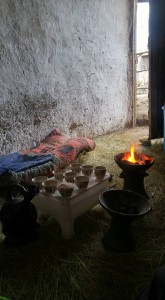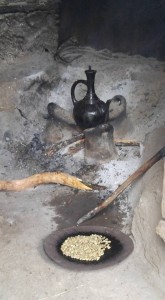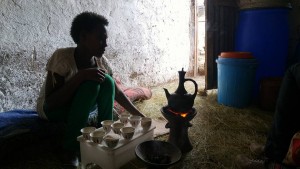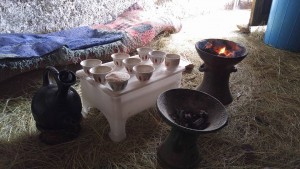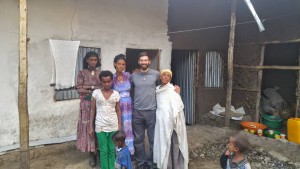A Higher Calling
As it so happens, Simen’s aunt lives practically around the corner from the school. We dropped in, and yet again I got the feeling that they weren’t expecting us. It didn’t seem to matter much as Simen’s aunt stopped what she was doing the moment we arrived and came over to give each of us a big hug. She was fairly short and slender, with a white shawl across her slightly hunched shoulders, and a tan countenance creased with wrinkles. As she approached us I could see kindness written all over her face. She had a maternal air about her, like a doting grandmother. She greeted me with a smile, but had many more words with Simen in Amharic, who she was excited to see. Simen turned to me, obviously pleased to be there. He simply said, “Come in.”
The building she lives in is shaped like the letter L, so that where we were standing formed a bit of a courtyard. Simen ushered me through the door, and the first thing I noticed was that the building seemed lower than a regular one story house. Her room was at the elbow of the L‘s longer side. It was a little smaller than the dimensions that I’d imagine a prison cell to have. As soon as I hunched over and stepped through the doorway I took a quick look around. To my right was a long row of hay bales covered with blankets. The floor had straw strewn about to cover the earth underneath where a floor would be. To the left was a shorter row of hay bales and a second doorway with no door attached. It led straight into a pool hall. There was one small light bulb in that doorway meant to illuminate both the pool hall and the room. There were several people in the other room drinking and playing pool, with music loud enough to spread through the whole mud structure. “Take a seat,” said Simen. I tried to sit on the edge of one of the beds that doubled as a bench, but the surface was so uneven and lumpy that it eventually started hurting my back just to sit on it. “Is it okay to sit on the floor and use this as a backrest?” I asked, hoping the question wasn’t in any way offensive. “Yes. It is fine,” was his reply.
While we waited for the coffee, which was being prepared in a small shed along the small side of the L shape, I began looking around to see if I could observe any additional details that would give me insight into the lifestyle or personality of Simen’s aunt. The only decorations adorning the tight quarters were a couple of small, brightly decorated baskets placed in the wall’s upper corners positioned like those convex mirrors inside of convenience stores. I pointed them out to Simen who immediately sprung to his feet and retrieved one of the baskets. Upon closer inspection it wasn’t hand woven with artisanal craftsmanship like the ones in the market. It was little more than a flimsy bowl-shaped piece of plastic with yarn woven in and out of the cheaply molded material. Simen, who simultaneously observed the same thing, didn’t seem to be disappointed by the lack of craftsmanship or embarrassed as I worried he might be. He said, “If you like it you can pay to her whatever you like and keep it for your own room. It is not very fancy. If you want it she can make another very easy.” I didn’t want Simen to think that I would empty my wallet at the slightest provocation, but then again he hadn’t asked for some exorbitant sum either, and I didn’t think Simen was motivated by money or I wouldn’t have spent so much time with him already. I had half expected that every basket in the village would be woven as finely as the ones sold to tourists at the market, but the reality was that while the basket in her house would never be seen on the walls of a craft stall, it was realistically the only type available and was being offered to me as a gift for whatever price I chose to name.
At that moment Simen’s aunt entered along with another relative who looked to be somewhere between his aunt’s advanced age and our own. With them was another helper, a neighbor who was there to assist with the coffee ceremony and partake in it with us. I was starting to get the sense that the ceremony had the latent function of bringing together members of the community to volunteer a small bit of their own labor free of charge and also share in ceremonies to which they are invited. It was a social event and ritualized custom that I had the privilege of being invited to, not just some gimmick to draw in tourists like the ones I’d seen at some hotels and restaurants. I was a little jealous that they had such a rich cultural tradition. At home in the U.S. I don’t even know my neighbors at all. I’d gladly build them a fire from time to time and make coffee from scratch if it meant getting to know them a little better, but as it stands at the moment I can hardly even see their houses over my landlord’s tall wooden fence.
“Salaamne,” I said to this new relative of Simen’s that entered the room. I didn’t have enough Amharic down to properly greet her beyond that, but something about her presence intrigued me. I wanted to greet her partly so that I could take a good look at her. Her features were clear as she stood in the portal, the only one in the room under the glow of the evening sun. What captured my attention was what looked like henna on first glance on the lower half of her face. When I got a closer look I realized that it was actually a permanent facial tattoo. This was a new one for me. I hadn’t come to Ethiopia to gawk at tribal people like I was visiting an open air zoo, and so had completely avoided the Oromo tribes of the south whose ornate piercings had given them more space in National Geographic magazines than they had in their own country under the rule of the racially biased Amharic central government. I had never seen anything like this in the north. The design was simple, with solid black lines in bold outlining her jaw and jutting out under her chin. So much about it was a mystery to me. I had to find a way to engage her in conversation so I could give her my full attention.
“Simen, is it considered rude to ask a woman her age here?” I asked inquired. “What do you mean, rude?” he replied. “Well, for example, in America it is sometimes rude to eat with your hands, but here no. In Ethiopia it is rude to use your left hand to touch people, hand them things, or shake hands, but in America that’s not rude. Do you understand?” I asked, hoping he would get the picture. “Yes, I understand. No, it is not rude. You can ask this,” he said. I responded, “Well then can you ask that woman how old she is? I’m just curious.” Simen posed the question to her. She smiled, and answered him. “She is 31,” he said, turning to face me. I was shocked. If I had to guess I would’ve assumed she was around 40. A life of manual labor must really take its toll, even more than I realized. The Ethiopian life expectancy of an average of 63 years was suddenly starting to make sense. It was as if people were aging more rapidly. Once I started looking at us as peers that put things in a whole new perspective. We were almost the same age. In a different world we would’ve almost been close enough in age to be married. I tried to imagine what life would be like under those circumstances, but it was impossible to fathom. “Simen, how old is your aunt?” was my next question. “She is around 50,” he replied. Again, I was shocked. If I had to guess I would have assumed her to be in her 70’s.
With the coffee finished roasting my musings were interrupted by a steaming hot teacup of fresh coffee being passed my way. I accepted it with my right hand, and smiled at the family’s young neighbor who served it shyly as she squatted by the fire in silence. I would’ve guessed that she was a little younger than me, but after my other guesses I suddenly wasn’t so sure. I didn’t want to ask about this other woman because I didn’t want it to be taken the wrong way. After a minute of sipping our coffee contently, Simen’s aunt said a few words to him that I could tell pertained to me in some way. She smiled her kind smile at me again. “Would you like to stay for dinner?” Simen asked me. I was a little relieved because I assumed that if she was willing to offer that meant I must be doing something right. I had been worried that my silent inability to communicate might be perceived as rude. “That would be great.” I said enthusiastically.
Simen’s aunt began the process of cooking, and I took advantage of the opportunity to question Simen further. “Why does she have tattoos on her face? What does it mean?” I asked tentatively. “They are for decoration. It is a tradition here in the farm villages. They don’t do it so much in the city,” he answered matter-of-factly. “How are they made?”I wondered aloud. “They are homemade. They use a needle and ink. I don’t know too much about it because it is only for women. Makes them more attractive when they are old enough to marry,” he said. “Does anyone in your family have them?” I asked. “Yes, both of my sisters do,” he replied. “Did you see them get it?” I asked. “My sisters are older, but I remember the younger one getting hers when I was very young. She was also young. I remember her screaming and crying. It look very painful,” I shuddered at the thought. Simen’s aunt began serving the food. As we ate another older woman came by to share the meal with us. I couldn’t tell if she was friend, relative, neighbor, or some combination of the 3. She, too, smiled at me with a broad welcoming smile. It was comforting to see so much friendliness in such an unfamiliar environment. In the middle of eating, however, she pulled out her breast and began breastfeeding an infant. Occasionally she would put the baby down and let her breast hang there exposed. It was a little unnerving. Not that there was anything wrong with it, I just wasn’t used to that kind of behavior. As soon as I began to feel comfortable and attain a sense of belonging, I got a jolting reminder that I was in a land as foreign to me as it could be familiar.
After our vigorous day hike and the martial arts workout of the night before, even the Scottish cheeseburger I had for lunch wasn’t enough to quench the fire of my metabolism. I couldn’t help but to dig into the bean dish zealously. Sensing my ravenous appetite, Simen’s aunt provided me with another piece of injera. I accepted it graciously, but halfway through my assault on the dish I realized that nobody else was taking extra portions of injera. In all of the restaurants I had eaten at they provided more injera than I could eat. It seemed like an attempt to ensure satisfaction, like when American restaurants provide free bread, except with a more nutritious substitute. Because of this I had become accustomed to making many more small sandwiches than I noticed the others making. Once I noticed this I started to slow down. Despite my hesitation, Simen’s aunt piled another rolled up portion of injera onto my plate. Then she gave me seconds of the bean dish. Before I knew it, I went from completely starving to not even sure I could finish the food. It seemed like she had loaded my plate with double the portion of anyone else. After polishing it off, I tactfully left a little food on my plate to signify that I was both satisfied and not in need of more. I thanked her profusely to the best of my abilities with the language barrier. It was starting to seem like we didn’t need a common language to communicate after all. Her eyes said it all. Here was a woman who had practically no material possessions and clearly lived from hand to mouth her whole life. I’m not even sure if she had been able to afford the coffee and dinner or if some of the other people in the room had helped out. She expected nothing in return. What’s more, she seemed genuinely happy. There was something that compelled her that I couldn’t fully understand. I sensed it in the room. It was almost tangible, as we all came together in that moment. It was something powerful, and whatever it is I’ll never forget it.


